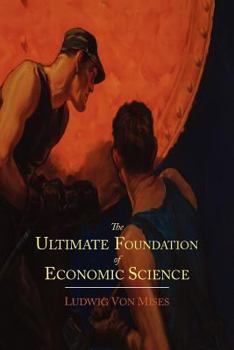The Ultimate Foundation of Economic Science: An Essay on Method
Select Format
Select Condition 
Book Overview
In this volume, Mises argued that economics is a science because human action is a natural order of life and that it is the actions of humans that determine markets and capital decisions. Since Mises... This description may be from another edition of this product.
Format:Paperback
Language:English
ISBN:1614273286
ISBN13:9781614273288
Release Date:July 2012
Publisher:Martino Fine Books
Length:162 Pages
Weight:0.76 lbs.
Dimensions:0.4" x 6.0" x 9.0"
Age Range:18 to 10 years
Grade Range:Postsecondary to Grade 5
Customer Reviews
1 rating
Von Mises The Rationalist
Published by Thriftbooks.com User , 21 years ago
Ludwig von Mises published his first book in 1912 ("Theory of Money and Credit") and his final book - "The Ultimate Foundation of Economic Science" - in 1962 (although he continued to write articles until near the end of his incredibly productive life).In "The Ultimate Foundation", von Mises returns to one of his central concerns: the foundation of economic theories. According to von Mises, the principles of economic thought are "a priori." In fact, they are a "subset" of more basic principles of human action. Von Mises called the study of human action "praxiology." According to Mises, the a priori categories "are the mental equipment by dint of which man is able to think and to experience and thus to acquire knowledge." [p. 18.] It is these categories which provide order and regularity to man's understanding. The category of human action is: "Man acts because he is dissatisfied with the state of affairs as it prevails in the absence of his intervention." [p. 3.] Further axioms follow logically from this axiom. [p. 45.] The principles of economics are therefore deductive. On the other hand, the principles of the physical sciences are inductive. The error of positivism is to apply the principles of the physical sciences to economics, where they are not applicable. Economics is closer to mathematics than it is to chemistry.It's hard to summarize this book. Von Mises deals with a large number of topics in a relatively small number of pages. These include evolution, Marxism, theism, the use of statistics, and methodological individualism. Yet what shines through is von Mises' love of economics and his belief that the teachings of economics - which is to say free enterprise - is the key to increasing man's standard of living and promoting social cooperation.Interestingly, von Hayek - Mises' best known student -- also returned to methodology in his final book, "The Fatal Conceit." While von Mises remained a rationalist until the end, Hayek drifted toward a more empirical approach to social and economic thought. It would make an interesting study to compare these two works. Joseph Salerno touches on some of these points in his essay "Mises as Social Rationalist" in Herbener, ed., "The Meaning of Ludwig von Mises."




